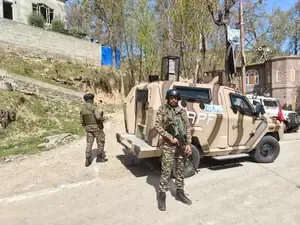What Did Operation Mahadev Reveal About ISI's Involvement in the Pahalgam Massacre?

Synopsis
Key Takeaways
- The Pahalgam attack resulted in 26 fatalities, highlighting the ongoing security challenges in Jammu and Kashmir.
- Sulaiman, a key figure in the attack, was eliminated during Operation Mahadev.
- The ISI's involvement underscores the extent of external influence in regional terrorism.
- Operation Sindoor targeted the Lashkar-e-Taiba's training facilities as a response to the attack.
- The investigation revealed a strategic focus on secrecy and isolation from local networks.
New Delhi, July 28 (NationPress) The involvement of the Pakistan Army in the Pahalgam terror attack that resulted in the loss of 26 lives has come into sharper focus following the elimination of Sulaiman, identified as the mastermind behind the incident. Sulaiman, also known as Hashim Moosa, was a member of the Lashkar-e-Taiba and an ex-Pakistani army official, who met his end during Operation Mahadev, executed by the CRPF and Jammu and Kashmir Police.
During this operation, two more terrorists, Abu Hamza and Yasir, were neutralized by security forces. "Three terrorists have been neutralized in an intense firefight. Operation continues," stated the official X handle of the Indian Army’s Chinar Corps.
The elimination of Sulaiman reinforces the assertion that the ISI played a significant role in the Pahalgam attack. As a highly trained terrorist and an asset of the ISI, Sulaiman was recruited to plan the attack due to his military background and experience in the Pakistan Army.
Investigations into the Pahalgam incident revealed that it was orchestrated by the ISI and Lashkar-e-Taiba. The attack was meticulously planned, with the decision made to recruit only Pakistani terrorists to keep the operation covert.
Initially, some local individuals were suspected of involvement, but further investigation revealed that while they provided shelter and food, they were unaware of any attack plans.
In the lead-up, the ISI tasked Sajid Jutt with ensuring that only Pakistani fighters were used for the operation. Jutt was instructed to pinpoint Pakistani Lashkar-e-Taiba operatives already active in the Valley, explicitly avoiding any local involvement to maintain secrecy.
The attack squad was led by Sulaiman, affiliated with the special forces commando unit of the Pakistan Army. He had been stationed in the Valley since 2022 after receiving training at the Muridke camp of the Lashkar-e-Taiba.
It is noteworthy that following the Pahalgam attack, India launched Operation Sindoor, which targeted Muridke, the primary training base of the Lashkar-e-Taiba.
Investigations indicated that Sulaiman was present in the Tral forest as early as April 15, positioning him close to the attack site at Baisaran nearly seven days prior to the incident.
Additionally, Sulaiman was implicated in an April 2023 attack on an army truck in Poonch, which resulted in the deaths of five soldiers.
While the roles of locals like Parvaiz Ahmad Jothar from Batkote, Pahalgam, and Bashir Ahmad Jothar from Hill Park were initially scrutinized, the investigation revealed that their contributions were minimal, limited to providing shelter and food for monetary compensation.
The questioning of these individuals confirmed their ignorance about the attack, underscoring that the ISI and Lashkar-e-Taiba sought to uphold the highest level of secrecy, executing the operation on a need-to-know basis. The Pahalgam attack was evidently aimed at fostering communal division and undermining the burgeoning tourism industry in Jammu and Kashmir following the abrogation of Article 370.










